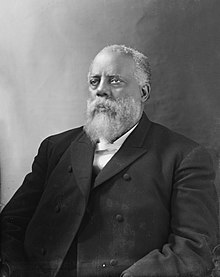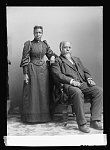Methodism, also called the Methodist movement, is a Protestant Christian tradition whose origins, doctrine and practice derive from the life and teachings of John Wesley. George Whitefield and John's brother Charles Wesley were also significant early leaders in the movement. They were named Methodists for "the methodical way in which they carried out their Christian faith". Methodism originated as a revival movement within Anglicanism with roots in the Church of England in the 18th century and became a separate denomination after Wesley's death. The movement spread throughout the British Empire, the United States and beyond because of vigorous missionary work, and today has about 80 million adherents worldwide.

John Wesley was an English cleric, theologian, and evangelist who was a leader of a revival movement within the Church of England known as Methodism. The societies he founded became the dominant form of the independent Methodist movement that continues to this day.
The Methodist Episcopal Church (MEC) was the oldest and largest Methodist denomination in the United States from its founding in 1784 until 1939. It was also the first religious denomination in the US to organize itself nationally. In 1939, the MEC reunited with two breakaway Methodist denominations to form the Methodist Church. In 1968, the Methodist Church merged with the Evangelical United Brethren Church to form the United Methodist Church.
The Methodist Episcopal Church, South was the American Methodist denomination resulting from the 19th-century split over the issue of slavery in the Methodist Episcopal Church (MEC). Disagreement on this issue had been increasing in strength for decades between churches of the Northern and Southern United States; in 1845 it resulted in a schism at the General Conference of the MEC held in Louisville, Kentucky.
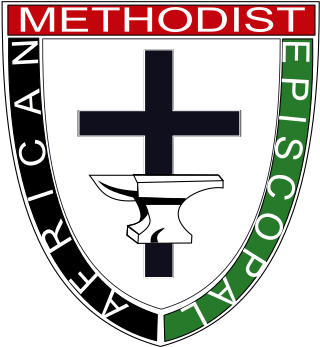
The African Methodist Episcopal Church, usually called the AME Church or AME, is a Methodist denomination based in the United States. It adheres to Wesleyan–Arminian theology and has a connexional polity. It cooperates with other Methodist bodies through the World Methodist Council and Wesleyan Holiness Connection.

The Christian Methodist Episcopal Church (C.M.E.C.) is a Methodist denomination that is based in the United States. It adheres to Wesleyan-Arminian theology. Though historically a part of the black church, the Christian Methodist Episcopal today has a church membership of people from all racial backgrounds.

The African Methodist Episcopal Zion Church, or the AME Zion Church (AMEZ) is a historically African-American Christian denomination based in the United States. It was officially formed in 1821 in New York City, but operated for a number of years before then. The African Methodist Episcopal Zion Church adheres to Wesleyan-Arminian theology.

Warren Akin Candler was an American bishop of the Methodist Episcopal Church, South, elected in 1898. He was the tenth president of Emory University.

John Christian Keener was an American bishop of the Methodist Episcopal Church, South, an author and an editor, and the superintendent of C.S.A. chaplains west of the Mississippi River during the American Civil War. He wrote several books on theology and edited the New Orleans Christian Advocate, a weekly Methodist newspaper sponsored by Methodist conferences in Louisiana and various nearby states in the late-19th and early-20th century. A collection of Keener's papers, available at the Stuart A. Rose Manuscript, Archives, and Rare Book Library at Emory University, include correspondence and military orders related to the return of property to the Methodist Church, South, after the war.
Boston University School of Theology (STH) is the oldest theological seminary of American Methodism and the founding school of Boston University, the largest private research university in New England. It is one of thirteen theological schools maintained by the United Methodist Church. BUSTH is a member of the Boston Theological Institute consortium.

The Vanderbilt Divinity School and Graduate Department of Religion is an interdenominational divinity school at Vanderbilt University, a major research university located in Nashville, Tennessee. It is one of only six university-based schools of religion in the United States without a denominational affiliation that service primarily mainline Protestantism.
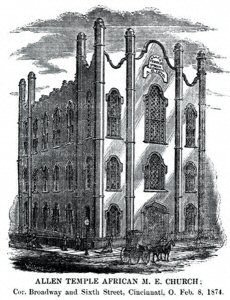
The Allen Temple AME Church in Cincinnati, Ohio, US, is the mother church of the Third Episcopal District of the African Methodist Episcopal Church. Founded in 1824, it is the oldest operating black church in Cincinnati and the largest church of the Third Episcopal District of the AME Church.

Wesleyan theology, otherwise known as Wesleyan–Arminian theology, or Methodist theology, is a theological tradition in Protestant Christianity based upon the ministry of the 18th-century evangelical reformer brothers John Wesley and Charles Wesley. More broadly it refers to the theological system inferred from the various sermons, theological treatises, letters, journals, diaries, hymns, and other spiritual writings of the Wesleys and their contemporary coadjutors such as John William Fletcher, Methodism's systematic theologian.
The ordination of women has been commonly practiced in Methodist denominations since the 20th century, and some denominations earlier allowed women to preach.

Henry McNeal Turner was an American minister, politician, and the 12th elected and consecrated bishop of the African Methodist Episcopal Church (AME). After the American Civil War, he worked to establish new A.M.E. congregations among African Americans in Georgia. Born free in South Carolina, Turner learned to read and write and became a Methodist preacher. He joined the AME Church in St. Louis, Missouri, in 1858, where he became a minister. Founded by free blacks in Philadelphia, Pennsylvania, in the early 19th century, the A.M.E. Church was the first independent black denomination in the United States. Later Turner had pastorates in Baltimore, Maryland, and Washington, DC.

The history of Methodism in the United States dates back to the mid-18th century with the ministries of early Methodist preachers such as Laurence Coughlan and Robert Strawbridge. Following the American Revolution most of the Anglican clergy who had been in America came back to England. John Wesley, the founder of Methodism, sent Thomas Coke to America where he and Francis Asbury founded the Methodist Episcopal Church, which was to later establish itself as the largest denomination in America during the 19th century.
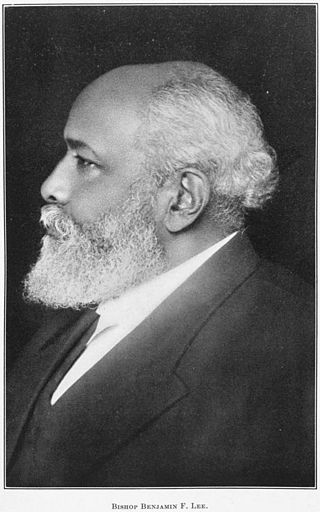
Benjamin Franklin Lee was a religious leader and educator in the United States. He was the president of Wilberforce University from 1876 to 1884. He was editor of the Christian Recorder from 1884 to 1892. He was then elected a bishop in the African Methodist Episcopal (AME) church, serving from 1892 until his resignation in 1921, becoming senior bishop in the church in 1915.

Bishop Singleton T. Jones was a religious leader in the African Methodist Episcopal Zion Church. Although he had little education, Jones taught himself to be an articulate orator and was awarded the position of bishop within the church. Besides being a pastor to churches, he also edited AME Zion publications, the Zion's Standard and Weekly Review and the Discipline.

John Wesley Alstork was an American religious leader and African-American community organizer. He was a preacher and bishop in the African Methodist Episcopal Zion Church and is considered one of the most successful bishops of his church, in part due to his skills at organizing national conferences. He also was a trustee at several schools for African-Americans, and a businessman. He lived in Montgomery, Alabama.
